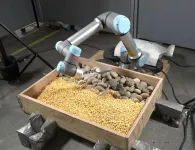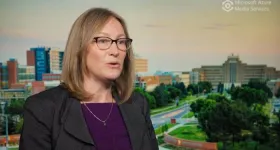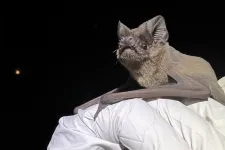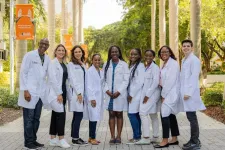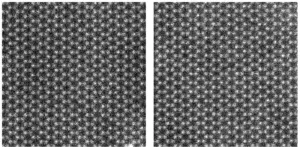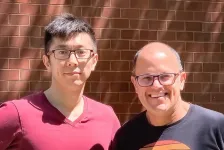(Press-News.org) Mars rovers have teams of human experts on Earth telling them what to do. But robots on lander missions to moons orbiting Saturn or Jupiter are too far away to receive timely commands from Earth. Researchers in the Departments of Aerospace Engineering and Computer Science at the University of Illinois Urbana-Champaign developed a novel learning-based method so robots on extraterrestrial bodies can make decisions on their own about where and how to scoop up terrain samples.
“Rather than simulating how to scoop every possible type of rock or granular material, we created a new way for autonomous landers to learn how to learn to scoop quickly on a new material it encounters,” said Pranay Thangeda, a Ph.D. student in the Department of Aerospace Engineering.
“It also learns how to adapt to changing landscapes and their properties, such as the topology and the composition of the materials,” he said.
Using this method, Thangeda said a robot can learn how to scoop a new material with very few attempts. “If it makes several bad attempts, it learns it shouldn’t scoop in that area and it will try somewhere else.”
The proposed deep Gaussian process model is trained on the offline database with deep meta-learning with controlled deployment gaps, which repeatedly splits the training set into mean-training and kernel-training and learns kernel parameters to minimize the residuals from the mean models. In deployment, the decision-maker uses the trained model and adapts it to the data acquired online.
One of the challenges for this research is the lack of knowledge about ocean worlds like Europa.
“Before we sent the recent rovers to Mars, orbiters gave us pretty good information about the terrain features,” Thangeda said. “But the best image we have of Europa has a resolution of 256 to 340 meters per pixel, which is not clear enough to ascertain features.”
Thangeda’s adviser Melkior Ornik said, “All we know is that Europa’s surface is ice, but it could be big blocks of ice or much finer like snow. We also don’t know what’s underneath the ice.”
For some trials, the team hid material under a layer of something else. The robot only sees the top material and thinks it might be good to scoop. “When it actually scoops and hits the bottom layer, it learns it is unscoopable and moves to a different area,” Thangeda said.
NASA wants to send battery-powered rovers rather than nuclear to Europa because, among other mission-specific considerations, it is critical to minimize the risk of contaminating ocean worlds with potentially hazardous materials.
“Although nuclear power supplies have a lifespan of months, batteries have about a 20-day lifespan. We can't afford to waste a few hours a day to send messages back and forth. This provides another reason why the robot’s autonomy to make decisions on its own is vital,” Thangeda said.
This method of learning to learn is also unique because it allows the robot to use vision and very little on-line experience to achieve high-quality scooping actions on unfamiliar terrains—significantly outperforming non-adaptive methods and other state-of-the-art meta-learning methods.
From these 12 materials and terrains made of a unique composition of one or more materials, a database of 6,700 was created.
The team used a robot in the Department of Computer Science at Illinois. It is modeled after the arm of a lander with sensors to collect scooping data on a variety of materials, from 1-millimeter grains of sand to 8-centimeter rocks, as well as different volume materials such as shredded cardboard and packing peanuts. The resulting database in the simulation contains 100 points of knowledge for each of 67 different terrains, or 6,700 total points.
“To our knowledge, we are the first to open source a large-scale dataset on granular media,” Thangeda said. “We also provided code to easily access the dataset so others can start using it in their applications.”
The model the team created will be deployed at NASA’s Jet Propulsion Laboratory’s Ocean World Lander Autonomy Testbed.
“We're interested in developing autonomous robotic capabilities on extraterrestrial surfaces, and in particular challenging extraterrestrial surfaces,” Ornik said. “This unique method will help inform NASA’s continuing interest in exploring ocean worlds.
“The value of this work is in adaptability and transferability of knowledge or methods from Earth to an extraterrestrial body, because it is clear that we will not have a lot of information before the lander gets there. And because of the short battery lifespan, we won’t have a long time for the learning process. The lander might last for just a few days, then die, so learning and making decisions autonomously is extremely beneficial.”
The open-source dataset is available at: drillaway.github.io/scooping-dataset.html.
The study, “Few-shot Adaptation for Manipulating Granular Materials Under Domain Shift,” by co-lead authors Yifan Zhu and Pranay Thangeda, and their faculty advisers Melkior Ornik and Kris Hauser, is published in Robotics: Science and Systems XIX. DOI: 10.15607/RSS.2023.XIX.048
END
Training robots how to learn, make decisions on the fly
2023-07-12
ELSE PRESS RELEASES FROM THIS DATE:
Substance use linked to long-lasting brain changes, cognitive decline
2023-07-12
An estimated 50 million individuals in the United States struggle with the challenges of cocaine or alcohol use disorders, according to the National Institutes of Health (NIH). Beyond the well-documented health risks, addiction to these substances detrimentally affects our cognitive flexibility, which is the ability to adapt and switch between different tasks or strategies. Although previous research has hinted at this connection, the underlying reasons for this cognitive impairment remain elusive.
Cognitive flexibility is a crucial element in various domains of our life, including ...
CU Anschutz study shows CBD use in pregnancy could impact the fetal brain
2023-07-12
AURORA, Colo. (July 11, 2023) – Researchers at the University of Colorado Anschutz Medical Campus have found that cannabidiol (CBD), often used to treat anxiety and nausea, can potentially harm a developing fetus.
The paper was published in Molecular Psychiatry today.
People consume cannabis or a non-psychoactive component cannabidiol (CBD) to help with nausea and anxiety during pregnancy because they think it is safe and healthy. But CBD crosses the placenta and accumulates in the fetal brain.
Until now, no one knew how fetal exposure to CBD affected brain development, said Emily ...
Paths for reducing harmful air pollution in South Asia identified
2023-07-11
Fine particulate matter comes from wood burning, power generation, motor vehicles and other combustion sources that emit tiny particles into the air. At only 2.5 micrometers or smaller, these particles are small enough to be inhaled and cause lasting damage to the heart and lungs. Known as PM2.5, exposure to these particles is a leading mortality risk factor in India and the surrounding region of South Asia.
A new study by researchers in Randall Martin’s lab in the McKelvey School of Engineering at Washington University in St. Louis evaluated the contribution of various emission sectors and fuels to PM2.5 mass for 29 states in India ...
Zoonotic researcher receives ORAU Ralph E. Powe Junior Faculty Enhancement Award
2023-07-11
Daniel Becker, Ph.D., an assistant professor of Biology in the Dodge Family College of Arts and Sciences, has received an Oak Ridge Associated Universities Ralph E. Powe Junior Faculty Enhancement Award for his continued research on bat migration in western Oklahoma.
“We’re studying migratory Mexican free-tailed bats and the pathogens they might carry that are possible threats to human or wildlife health,” Becker said. “This award allows us to purchase the microchips we implant in the bats and ...
Cancer disparities: Sylvester researchers, collaborators seek answers to prostate, breast cancer among people of African ancestry
2023-07-11
MIAMI, FLORIDA (July 11, 2023) – “Please, please do it (cancer screening), if not for yourself, then for the next generation. We need to see the day when we end cancer.”
Those are the impassioned words of Charinus Johnson-Davis, who was diagnosed with breast cancer a dozen years ago but is now cancer-free after a double-mastectomy and 28 rounds of chemotherapy plus radiation. She is on a mission to help address cancer disparities affecting Black women and men, and is one of the first to enroll in the African Cancer Genome Registry, a new study at Sylvester Comprehensive Cancer ...
AGS supports CMS decision to require real-world data for monoclonal antibodies
2023-07-11
New York (July 11, 2023) — The American Geriatrics Society (AGS) supports the recently announced decision from the Centers for Medicare and Medicaid Services (CMS) to require the collection of real-world information via a registry to study monoclonal antibodies directed against amyloid for the treatment of Alzheimer's disease. This decision applies to monoclonal antibodies that receive traditional approval from the Food and Drug Administration (FDA). Currently, lecanemab (trade name ...
GSA Connects 2023: A premier international scientific meeting
2023-07-11
11 July 2023
The Geological Society of America
Release no. 23-25
Contact: Justin Samuel
+1-303-357-1026
jsamuel@geosociety.org
For immediate release
GSA Connects 2023: A Premier International Scientific Meeting
The Geological Society of America visits Pittsburgh
Boulder, Colo., USA: Media registration is open now for The
Geological Society of America’s Connects 2023
meeting, to be held 15–18 October 2023 at the David L Lawrence Convention
Center (1000 Fort Duquesne Blvd) in Pittsburgh, Pennsylvania, USA. The
organizing committee is pleased to be planning a dynamic meeting centered
around ...
Generative AI ‘fools’ scientists with artificial data, bringing automated data analysis closer
2023-07-11
The same AI technology used to mimic human art can now synthesize artificial scientific data, advancing efforts toward fully automated data analysis.
Researchers at the University of Illinois Urbana-Champaign have developed an AI that generates artificial data from microscopy experiments commonly used to characterize atomic-level material structures. Drawing from the technology underlying art generators, the AI allows the researchers to incorporate background noise and experimental imperfections into the generated ...
Satisfaction with online dating app depends on what you’re looking for
2023-07-11
With an estimated 75 million active users each month, Tinder is the most popular dating app in the world. But a new study by Stanford Medicine researchers and collaborators has found, surprisingly - though perhaps not to users of the app - that many users are not swiping for dates.
In a survey of more than a thousand Tinder users, half said they were not interested in meeting offline, and nearly two-thirds were already married or "in a relationship."
In fact, the psychological motivations behind people's use of the app varied widely and had a strong influence on their satisfaction with the app and the dates it led to, according to the study published June 23 ...
University of Illinois study finds turning food waste into bioenergy can become a profitable industry
2023-07-11
URBANA, Ill. — Food waste is a major problem around the world. In the United States, an estimated 30 to 40% of edible food is lost or wasted, costing billions of dollars each year. One potential solution is to divert food waste from landfills to renewable energy production, but this isn’t done on a large scale anywhere. A new study from the University of Illinois Urbana-Champaign investigates the feasibility of implementing energy production from food waste in the state of Illinois.
“We have a large amount of organic waste in the U.S., which eventually enters landfills and emits greenhouse gasses. However, this material ...
